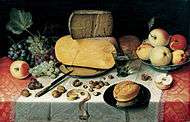Elevenses
| Part of a series on |
| Meals |
|---|
 |
| Meals |
| Components and courses |
| Related concepts |
Elevenses (pronunciation: /ᵻˈlɛvənzᵻz/) is a short break taken at around 11 a.m. to consume a drink or snack of some sort. The name and details vary between countries.
Regional variations
Australia and New Zealand
In Australia and New Zealand elevenses is known as 'morning tea', and can occur at any point between the start of the working day and lunchtime. Many workplaces organise morning teas for staff to welcome new employees, for special occasions such as a birthday, or simply as a regular event. Food will sometimes be provided by the business, but often employees will be expected to bring food to share.[1][2]
Chile
In many Spanish-speaking cultures, elevenses is observed under the name la once (the eleven in Spanish). However, in Chile it has shifted to the afternoon.[3]
Netherlands
In West Friesland country people had a similar meal called "konkelstik" (served at "konkeltoid", the proper time for "konkelen", a verb denoting "making a visit").[4][5]
United Kingdom
Elevenses typically consists of tea or coffee, often with a biscuit.[6]
Spain
In Euskadi it's common to have a mid-morning snack consisting on high-protein food like eggs, bacon or cured meats on bread, called hamarretako (literally "10 o'clock snack") or hamaiketako ("11 o'clock snack")
United States
During the first decades of the 19th century, elevenses consisted of drinking whiskey.[7]
Israel
In Israel it called "ארוחת עשר" (Hebrew: "10 o'clock meal"), mostly eaten at schools & kindergartens in the form of homemade sandwiches, often accompanied with a fruit or other snack, after the second hour of the schoolday & before the big break. It also occurs in major unionized workplaces, such as factories & customer services reception centres, where workers are handed tea.
Hungary
Elevenses in Hungarian is called "Tíz-órai" which translates to "of the 10 o'clock" referring to "the meal of the 10 o'clock." This is a break between breakfast and lunch when it is time for a light meal or snack. In schools the early lunch break is called a "Tíz-órai" break.
In literature
For elevenses, Winnie-the-Pooh preferred honey on bread with condensed milk. Paddington Bear often took elevenses at the antique shop on Portobello Road run by his friend Mr Gruber,[8] for which Paddington would buy buns and Mr Gruber would make cocoa (hot chocolate).
In the Middle-earth stories by J. R. R. Tolkien (The Lord of the Rings), it is a meal eaten by Hobbits between second breakfast and luncheon.[9]
Other uses
Elevenses is the name of a brand of clothing sold by Anthropologie.
See also
References
- ↑ "The cheats' guide to morning teas". Stuff.co.nz.
- ↑ "Like a boss: 10 terrific ideas for your office morning tea". Food Daily.
- ↑ Collier, Simon (2004). A History of Chile, 1808-2002. Cambridge University Press. ISBN 0-521-53484-4.
- ↑ Thijs, J. G. A. (1984). Taal ter sprake (in Dutch). Nijgh & Van Ditmar. p. 40. ISBN 9789023655930. Retrieved 25 December 2012.
- ↑ ter Horst-Hoekstra, A. C. (1953). "'t Pistoal: Een Westfriese historie (1870-1878)". De Speelwagen (in Dutch). 8 (10): 303–12.
- ↑ Harper, Timothy (1997). Passport United Kingdom: Your Pocket Guide to British Business, Customs and Etiquette. World Trade Press. ISBN 1-885073-28-3.
- ↑ Pollan, Michael (October 12, 2003). "THE WAY WE LIVE NOW: 10-12-03; The (Agri)Cultural Contradictions Of Obesity". The New York Times Magazine.
- ↑ Bond, Michael (1997). Paddington abroad. London: Collins. p. 14. ISBN 0007402570.
- ↑ Tolkien, J. R. R. (1954), The Fellowship of the Ring, The Lord of the Rings, Boston: Houghton Mifflin (published 1987), Chapter 1: A Long-Expected Party, ISBN 0-395-08254-4
External links
-
 The dictionary definition of elevensies at Wiktionary
The dictionary definition of elevensies at Wiktionary